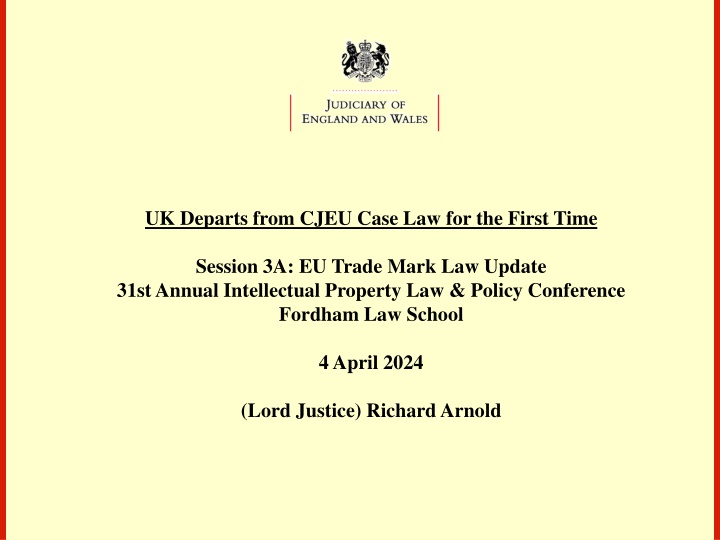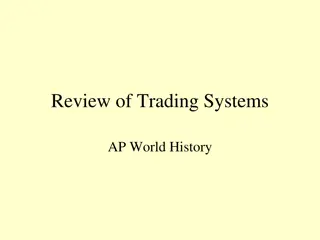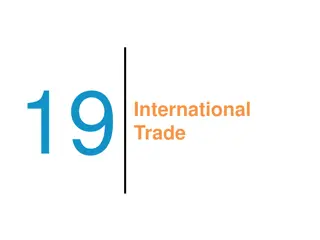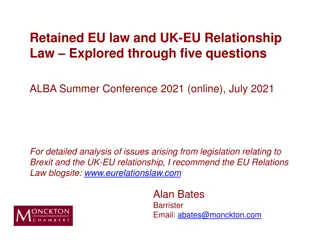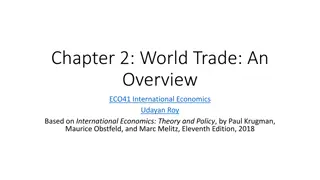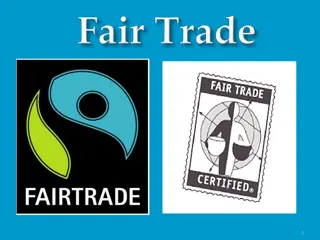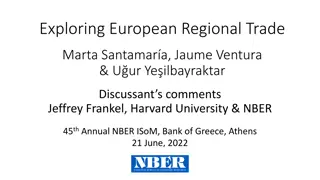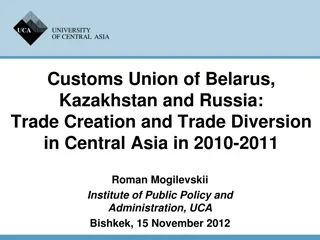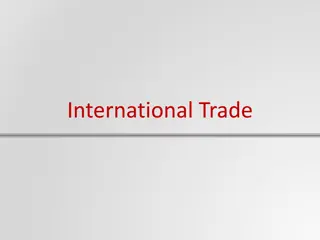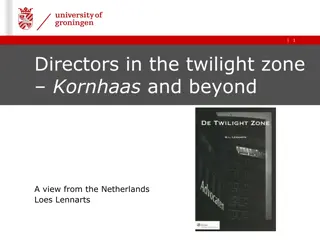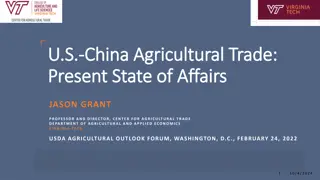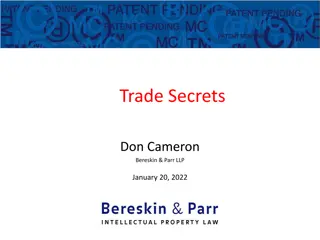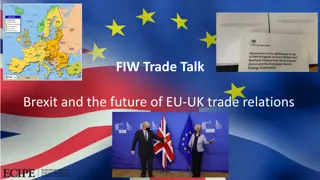UK's Departure from CJEU Case Law: Legal Effects & EU Trade Mark Law
The UK's departure from CJEU case law has significant legal implications, especially in EU Trade Mark Law post-Brexit. Retained EU law, including case law and general principles, continues to influence decisions. Courts can depart from pre-2020 CJEU rulings under specific circumstances, as seen in recent cases like Warner Music UK v. TuneIn. The Article 9 Directive limits the rights of earlier trade mark proprietors based on acquiescence. Stay informed about the evolving legal landscape in light of Brexit.
Download Presentation

Please find below an Image/Link to download the presentation.
The content on the website is provided AS IS for your information and personal use only. It may not be sold, licensed, or shared on other websites without obtaining consent from the author.If you encounter any issues during the download, it is possible that the publisher has removed the file from their server.
You are allowed to download the files provided on this website for personal or commercial use, subject to the condition that they are used lawfully. All files are the property of their respective owners.
The content on the website is provided AS IS for your information and personal use only. It may not be sold, licensed, or shared on other websites without obtaining consent from the author.
E N D
Presentation Transcript
UK Departs from CJEU Case Law for the First Time Session 3A: EU Trade Mark Law Update 31st Annual Intellectual Property Law & Policy Conference Fordham Law School 4 April 2024 (Lord Justice) Richard Arnold
Legal effects of Brexit from 31 December 2020 to 1 January 2024 European Union (Withdrawal) Act 2018 (as amended by European Union (Withdrawal Agreement) Act 2020) created five categories of retained EU law after Brexit: (i) EU-derived domestic legislation (particularly primary and secondary legislation which implemented Directives); (ii) direct EU legislation which applied to the UK (such as Regulations); (iii) saved directly effective rights; (iv) retained case law; (v) retained general principles of law. The general effect of category (i) is that the legislation transposing EU Directives which had been implemented by the UK prior to 23:00 GMT on 31 December 2020 will remain in full force and effect unless and until it is repealed or amended by domestic legislation. This includes the Trade Marks Act 1994 (as amended). The EU Trade Mark Regulation no longer applies to the UK, but comparable UK trade marks were cloned from extant EUTMs on 31 December 2020.
Legal effects of Brexit from 31 December 2021 to 1 January 2024 The general effect of category (iv) is that CJEU decisions rendered prior to 23:00 GMT on 31 December 2020 concerning retained EU law remain binding below the level of the Court of Appeal (or in Scotland the Inner House of the Court of Session), and may only be departed from by the Court of Appeal or the Supreme Court in circumstances where the Supreme Court would depart from one of its own precedents. As for post-31 December 2020 CJEU decisions, courts and tribunals are not bound by them, but may have regard to them so far as relevant. In Warner Music UK v TuneIn [2021] EWCA Civ 441, the Court of Appeal declined to depart from the CJEU s pre-31 December 2020 case law on the interpretation of communication to the public in Article 3(1) of the Information Society Directive 2001/29/EC. Furthermore, it regarded Case C-392/19 VG Bild-Kunst v Stiftung [EU:C:2021:181], a post-31 December 2020 judgment, as highly persuasive. Preu ischer Kulturbesitz
Article 9 Directive 89/104/EEC: Limitation in consequence of acquiescence 1. Where, in a Member State, the proprietor of an earlier trade mark as referred to in Article 4(2) has acquiesced, for a period of five successive years, in the use of a later trade mark registered in that Member State while being aware of such use, he shall no longer be entitled on the basis of the earlier trade mark either to apply for a declaration that the later trade mark is invalid or to oppose the use of the later trade mark in respect of the goods or services for which the later trade mark has been used, unless registration of the later trade mark was applied for in bad faith. 2. Any Member State may provide that paragraph 1 shall apply mutatis mutandis to the proprietor of an earlier trade mark referred to in Article 4(4)(a) or another earlier right referred to in Article 4(4)(b) or (c). 3. In the cases referred to in paragraphs 1 and 2, the proprietor of a later registered trade mark shall not be entitled to oppose the use of the earlier right, even though that right may no longer be invoked against the later trade mark.
Case C-482/09 Budejovick Budvar v Anheuser-Busch [2011] ECR I-8701 53 It is apparent from the wording of Article 9(1) of Directive 89/104 that four conditions must be satisfied before the period of limitation in consequence of acquiescence starts running . 54 First, since Article 9(1) refers to a later registered trade mark , registration of that mark in the Member State concerned constitutes a necessary condition. 55 56 Second, the application for registration of the later trade mark must have been made by its proprietor in good faith. 57 Third, the proprietor of the later trade mark must use his trade mark in the Member State where it is registered. 58 Fourth, the proprietor of the earlier trade mark must be aware of the registration of the later trade mark and of the use of that trade mark after its registration.
Industrial Cleaning Equipment v Intelligent Cleaning Equipment [2023] EWCA Civ 1451 Both parties used acronym ICE and logo incorporating acronym. Claimant had used ICE acronym since 1992 and logo since 2007. Claimant was proprietor of UK registration for logo in Classes 35 and 37 with filing date of 23 October 2015 and date of entry in register of 22 January 2016. First Defendant was proprietor of International (EU) registrations for ICE and logo in Class 7 with international registration date of 18 June 2015 and dates of entry in EU register of 24 May 2016 and 14 June 2016. Defendants had used these marks in the UK since at least June 2014. Claimant admitted knowledge of use of Defendants trade marks from July 2014. Claimant denied knowledge of any registration of Defendants trade marks until 26 July 2019, a denial the judge accepted. Claimant issued claim form for trade mark infringement, passing off and invalidation of Defendants trade marks on 24 May 2021.
Industrial Cleaning Equipment v Intelligent Cleaning Equipment The judge held that Defendants had infringed Claimant s trade mark and that Defendants registrations were invalid due to conflict with Claimant s earlier right (passing off). She rejected Defendants defence of acquiescence on ground that, applying Budvar, time did not start to run until 26 July 2019, less than 5 years before the claim form was issued. Defendants appealed, contending that (1) Budvar was wrong and that time starts to run when proprietor of earlier trade mark knows of use of later trade mark and it is fact registered and (2) the registration date of Defendants trade marks was the international registration date, 18 June 2015. On these bases time had started to time on 18 June 2015, the claim form had been issued more than 5 years later and so the claims for infringement, passing off and invalidity were all barred by acquiescence. (Defendants did not argue that their registrations were earlier than the Claimant s, presumably because that would be no answer to passing off and invalidity claims where Claimant was clearly the senior user.)
Industrial Cleaning Equipment v Intelligent Cleaning Equipment The Court of Appeal upheld ground (1), but rejected ground (2). Hence time started to run from 24 May 2016. Since the claim form had been issued on the last day of the 5 year period, the claims were not barred. The Court of Appeal departed from Budvar with respect to the fourth condition, holding that having regard to the wording, context and purpose of Article 9(1) knowledge by the proprietor of the earlier trade mark of the registration of the later trade mark was not required in order for time to start running. In so holding, the Court of Appeal followed a series of cases in the EUIPO Boards of Appeal (particularly Case R 1299/2007-2 Cristanini v Ghibli SpA) and General Court (starting with Case T-133/09 I Marchi Italiani Srl v Office for Harmonisation in the Internal Market (Trade Marks and Designs) [EU:T:2012:327]) which have formulated the fourth condition differently to Budvar, namely as only requiring knowledge of the use of the later trade mark after its registration.
Retained EU Law (Revocation and Reform) Act 2023 This Act is designed to reduce the influence of EU law on UK law in various ways: Various items of EU-derived legislation have been repealed (none of any continuing relevance to intellectual property). Retained EU law is renamed assimilatedlaw . With effect from 1 January 2024 supremacy of EU law and general principles of EU law (both previously retained EU law with respect to pre-31 December 2020 legislation and acts) no longer form part of domestic law. Section 6 (not yet in force) is designed to make it easier for UK courts to diverge from CJEU decisions. It remains to be seen what impact the Act will have in the context of intellectual property law.
